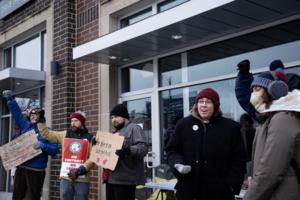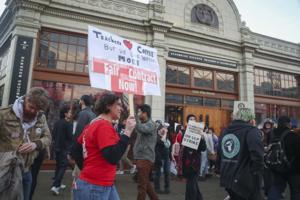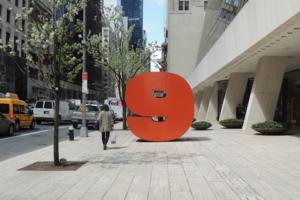Business
/ArcaMax

Starbucks baristas go on strike in several Chicago, Seattle, Los Angeles stores
Starbucks baristas went on strike at several stores in Chicago, Seattle and Los Angeles on Friday, with their union warning the walkouts could spread to hundreds of cafes by Christmas Eve if the coffee giant does not meet workers’ demands at the bargaining table.
In Chicago, baristas at the company’s store at 5964 N. Ridge Ave. in Edgewater...Read more

Starbucks baristas call 5-day strike. Here's what to expect in Seattle
Starbucks employees at unionized stores across the country began what they plan to be a series of escalating strikes Friday, launching a work stoppage at the coffee giant’s Seattle flagship cafe.
Starbucks Workers United, the union representing store workers, says it is prepared to keep the strike going through Christmas Eve. The union said ...Read more

CFPB sues JPMorgan, Bank of America over alleged Zelle fraud
The Consumer Financial Protection Bureau sued JPMorgan Chase & Co., Bank of America Corp. and Wells Fargo & Co. along with the parent company of Zelle alleging the firms rushed a peer-to-peer payment network to market without adequate consumer protections.
“By their failing to put in place proper safeguards, Zelle became a gold mine for ...Read more

Party City immediately closing all stores after 38 years in business
The party is over for Party City as the retail giant announced Friday it was going out of business and closing all its stores after nearly 40 years.
Employees of the New Jersey-based party chain were informed in a Friday meeting they were losing their jobs five days before Christmas and would be let go sans severance pay or extension of ...Read more

Federal regulators propose new plan for evaluating self-driving vehicle tech
WASHINGTON — Federal regulators on Friday announced plans to further evaluate the safety of vehicles equipped with automated driving systems, a potential precursor to nationwide standards for rapidly advancing self-driving technology.
The ADS-equipped Vehicle Safety, Transparency, and Evaluation Program, known as AV STEP, would create a ...Read more

'Everybody wants to be my friend': Trump marvels at tech titan attention
The most powerful leaders in the tech industry are trying out a new playbook to engage Donald Trump, who has been historically opposed to their dominance: in-person dining.
A steady stream of some of the biggest names in technology — Meta Platforms Inc.’s Mark Zuckerberg, Google co-founder Sergey Brin and Amazon.com Inc.’s Jeff Bezos — ...Read more

Former Las Vegas Strip gaming exec stripped of gaming license
The Nevada Gaming Commission on Thursday took away the gaming license of the former top executive of the MGM Grand and Resorts World Las Vegas.
Commissioners voted 3-0 with Commissioner Rosa Solis-Rainey absent to revoke the license of Scott Sibella by approving a stipulation of settlement signed by members of the Nevada Gaming Control Board on...Read more

Nebraska AG sues UnitedHealth Group over health data breach at Change Healthcare
The attorney general in Nebraska has sued Minnetonka-based UnitedHealth Group over a cyberattack earlier this year at the company’s Change Healthcare subsidiary that affected the personal health data of about 100 million patients and hobbled systems for filling prescriptions and paying health care providers across the country.
The hack could ...Read more

Why it's impossible to make a car without China, regardless of tariffs
WASHINGTON — Even as the Trump and Biden administrations have taken and maintained aggressive stances on reducing China's role in major U.S. manufacturing sectors, auto industry veterans say it remains impossible to build cars and trucks without help from the Far East.
That will likely stay true even if Republican President-elect Donald Trump...Read more

Racy Honda Prelude coupe returns to US as a hybrid
The sporty Honda Prelude is back.
The Japanese automaker announced the return of the iconic two-door coupe to North America with a concept that closely resembles production plans. The Prelude is scheduled to join the brand’s lineup late next year as a 2026 model. Prelude first washed up on U.S. shores in 1979 and was discontinued in 2001 ...Read more

2024 Mercedes Benz E-class has the appeal sedan lovers demand
With the 2024 models phasing out of the review fleet and 2025s arriving daily, Mercedes made a special request to get the E450 in for a classic luxury review. We enjoyed it very much.
Put your seat back and imagine the year is 1965, with big-body muscle cars all the rage while the length and engine combination demanded ultra plush comfort. We ...Read more

Auto review: A New battery-electric flagship for Volvo: the 2025 EX90
Designers always spend the most time working on exterior car designs to attract buyers, sometimes with disastrous results. But it’s the interior that matters more, as that’s what any car owner and their family and friends is going to look at the most. That dichotomy comes into play on the 2025 Volvo EX90, Volvo’s new battery-electric ...Read more

Amazon, OSHA reach settlement over warehouse safety citations
Federal safety regulators have dropped nine of 10 citations accusing Amazon of putting warehouse workers at a high risk of injury, part of a settlement agreement that requires the company to continue finding ways to reduce injuries.
The Occupational Safety and Health Administration began a series of investigations at 10 Amazon facilities around...Read more

Big Lots announces 'going out of business' sale after bankruptcy deal falls through
Discount retailer Big Lots has launched “going out of business” sales at all of its remaining locations after a deal to save the company from bankruptcy collapsed.
Big Lots announced the decision on Thursday, three months after filing for Chapter 11 bankruptcy. The company has already closed more than 400 stores in 2024.
“We all have ...Read more

Liberty Mutual to pull out of California condo, rental insurance markets
Even as regulators phase in new reforms to stabilize California’s faltering home insurance market, Liberty Mutual plans to drop all its condo and rental policies statewide starting in 2026.
Ahead of the move, Safeco, a Liberty subsidiary, is preparing to stop writing new condo and rental policies at the beginning of next year. Liberty hasn’...Read more

Amazon strike hits Southern California warehouses during holiday rush
Workers at several Amazon warehouses across the country went on strike early Thursday morning, part of an effort by the Teamsters union to pressure the e-commerce giant to recognize burgeoning unions at its facilities.
The work stoppage comes in the final stretch of the holiday shopping crush when customers are banking on Amazon to deliver ...Read more

Mississippi River advocates raise concerns about company's plan to mine riverbed
A mining company that operates a sand and gravel mine on Lower Grey Cloud Island in Cottage Grove, Minnesota, wants to expand and shift operations into the Mississippi River – and mine the actual riverbed.
Holcim MWR Inc., formerly Aggregate Industries, is proposing to move its mining area to mine additional aggregate reserves on about 400 ...Read more

Prop houses and other Hollywood businesses seek to promote filming in California
LOS ANGELES — Nearly three dozen local film, television and streaming production businesses and associations have launched an advocacy group aimed at improving conditions for filming in the state.
The California Production Coalition, formed this week in Los Angeles, aims to voice the concerns of prop houses, equipment leasing firms and other ...Read more

Amazon delivery drivers in 7 facilities nationwide go on strike
Hundreds of drivers at Amazon facilities in seven locations nationwide launched a strike Thursday morning, potentially disrupting holiday deliveries in an effort to get the online retailing giant to recognize their affiliation with the Teamsters union and negotiate a labor contract.
The walkout was set to begin at 5 a.m., with workers at other ...Read more

Private credit plots expansion in bid for $40 trillion prize
Private credit firms want more than corporate lending. The largest are laying the groundwork to finance everything from auto loans and residential mortgages to chip manufacturing and data centers in an effort to swell the size of the market by the trillions.
It’s part of a race to grab a bigger share of a universe of potential investments ...Read more
Popular Stories
- Big Lots announces 'going out of business' sale after bankruptcy deal falls through
- One Colorado county's property values just plummeted. Here's why officials aren't panicking amid oil booms and busts.
- Why it's impossible to make a car without China, regardless of tariffs
- Former Las Vegas Strip gaming exec stripped of gaming license
- Nebraska AG sues UnitedHealth Group over health data breach at Change Healthcare










